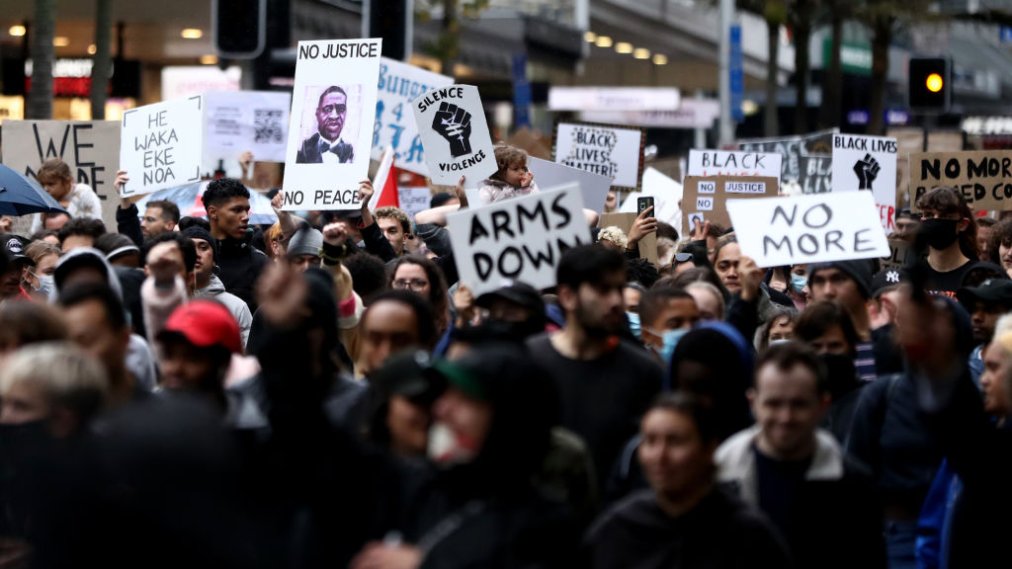The widespread protest regarding the death of George Floyd at the hands of Minnesotan police officers has brought the issue of systemic racism – both in America and NZ – into the open. Can we make a change? New Zealand’s history of social activism suggests yes.
By Nick Howell
The killing of African-American George Floyd on May 25 has brought the issue of systemic racism squarely into the spotlight, with many seeing how differently minorities are treated in the Western world. Many are showing their frustrations at systemic injustice through wide-scale protest and rioting, mostly throughout the cities of America – but in Auckland as well. Others are blaming the divisive rhetoric of U.S. President Donald Trump. Academics like Robert Dahl and Moana Jackson argue that racism is a deeply rooted phenomenon intrinsic to both the New Zealand and American experience, with Trump being all but a symptom of the unequal treatment that has been afforded to minorities since colonisation [1]. The confronting nature of the rioting and protesting in America right now inevitably leads to one asking what should be done. This piece briefly explores and compares the histories of New Zealand and the United States and traces how that history moulds the climate of today. Is the time ripe for change?

History:
African-Americans in the U.S. and Maori in New Zealand are both prominent minorities who suffer worse outcomes in nearly every available statistic: from life expectancy to net worth. Much research has been given to this end, with a near consensus agreeing that institutional racism and violence is largely to blame. Consider two notable facts: that both groups were deprived of the right to vote through the legal mechanisms of the time; and that they were economically deprived – African-Americans through slavery and Jim Crow laws, and Maori through stolen land. It follows that they have struggled to recover; the legal systems of both the U.S. and New Zealand have offered little recourse. These facts are only a snapshot of injustice but clearly show the relationship between historical injustice and current inequality. The below graph shows the dire economic situation for Maori when compared to other groups in New Zealand.

Average Maori net worth in 2016 was $23,000 – one fifth the Pakeha net worth of $114,000 [2]. Such economic disadvantage has inevitably manifested itself in worse outcomes for Maori: higher crime, lower life expectancy, and other negative factors. So what has been done to address such a gross discrepancy? Surprisingly – little.
Current Policy:
Current statutorily embedded protections appear to be insufficient in safeguarding against discrimination. Consider the Human Rights Act 1993 and the Employment Relations Act 2000 – both created to protect against discrimination, especially in the workplace [3]. However, Statistics show that Maori among other minorities still suffers significant discrimination in the workplace [4]. Such discrimination may not even be visible but implicit in others behaviour. The U.S. study “Are Emily and Greg More Employable than Lakisha and Jamal? A Field Experiment on Labor Market Discrimination” revealed how this works in practice [5]. This study was devoted to supposed equal opportunity employers – in seeing exactly how equal they really were during the hiring process. Their results showed that white Americans had a 50 percent higher chance of receiving a call-back than African-Americans when applying for jobs. What is startling is that African-Americans with significant expertise or qualifications were still less sought after than white Americans without such qualifications. In Aotearoa 10 per cent of Maori report discrimination in the workplace compared to 4.4 per cent of Pakeha suggesting such issues could be commonplace here [6].
Why is current policy failing?
The inadequacy of current anti-discrimination law is evident. Its shortcomings exemplify just why it is so important that change radiates upwards. Society changes quicker than law – Parliamentary procedure has proved to be sluggish and often not reflective of the wants of the many. Much policy that is now considered normal began with a groundswell of support mobilised by the people, including the right for women to vote, gay marriage and the minimum wage [7]. The universal groundswell of recognition and support regarding racial injustice may be able to go some way towards alleviating the systemic injustice suffered by both Maori and African-American communities. Already in the days following the death of George Floyd, popular movements have put forward policy they believe is necessary in combatting black-discrimination at the hands of police. Campaign Zero, a U.S. anti-police brutality movement, has put forward 8 policies that they say reduces police violence by 72 per cent: such policy including a ban on choking and requiring de-escalation [8]. Former U.S. President Barack Obama recently spoke out in arguing that now is the time to manifest momentum into real change, stating, “eventually, aspirations have to be translated into specific laws and institutional practices.” [9] To place all efforts into criminal justice reform ignores the pipeline through which lack of economic opportunity manifests itself into crime. Whilst undeniable that minorities are unduly discriminated against throughout all stages of the judicial system – those wishing to create change should focus efforts into providing opportunity. [10]. That is to say that, rather than placing the hospital at the bottom of the cliff, they should help in preventing the cliff being jumped in the first place.
Historical Precedent:
New Zealand has a long history of social activism in the face of racial injustice. The Polynesian Panthers, modelled on the American Black Panther movement, were active in the early 1970s. Polynesian families were discriminated against and forcibly deported from the nation amidst fierce nationalism and a failing economy. Although many Polynesian families had set up home here and contributed to the fabric of the nation, they were no longer wanted. Police officers would conduct so-called ‘dawn raids’, where they would enter households in the middle of night or early morning – unceremoniously cuffing them and shipping them off [11]. The Polynesian Panthers recognised the injustice that was at hand and retaliated in kind. They conducted their own form of dawn raids – on the politicians responsible for authorising such actions. Politicians quickly became self-aware of the brutal nature of what they were doing, and soon afterwards the dawn raids on Polynesian communities ceased [12].
Polynesian Panthers also played a principle role amongst other actors in the anti-Apartheid protests that rocked the nation in the 1980s. Violent protests in opposition to a Springbok rugby tour in New Zealand forced its cancellation. Mass movements made their voice and stance known – that the systemic discrimination against blacks in South Africa had no place in any nation.

Manifesting through Momentum:
Those who wish to make an impactful change will need to mobilise through activism and protest. An insightful study recently showed that non-violent protests with 3.5 per cent of the nation’s population involved have – never – failed to get what they want [13]. In other words, the more people involved, the higher the chance of success. This wisdom was known by names we now prophesise, like the civil rights leaders Gandhi and Martin Luther King. The success of any movement will depend on the breadth of its appeal and the maintenance of its momentum. The events of the coming months will decide whether any silver lining can be gained from the tragic death of George Floyd. The strong history of Kiwi activism and the Auckland protest of June 1st suggests that many are hungry for change in New Zealand. Already, a proposed arming of the police has been cancelled – with widespread petitioning and indignation likely having a significant role in prevention [14]. Particular criticism was given to what many believe to be the disproportionate use of police violence against Maori and Pasifika communities [15]. It remains to be seen whether more comprehensive progress will be made in the struggle against systemic inequity. But, the increasing political awareness and involvement of many Kiwis may go a long way towards succeeding in such struggles.

The views and opinions expressed in this article are those of the author and do not necessarily conflict nor conform with those of the Public Policy Club.
Sources:
[1] https://e-tangata.co.nz/comment-and-analysis/moana-jackson-understanding-racism-in-this-country/
[2] http://archive.stats.govt.nz/browse_for_stats/people_and_communities/Net%20worth/ethnicity.aspx
[3] https://employsure.co.nz/guides/employment-contracts-legislation/equal-opportunity/
[4] http://ftp.iza.org/dp7504.pdf
[5] https://www.nber.org/papers/w9873
[6] http://ftp.iza.org/dp7504.pdf
[7] https://hbr.org/2017/01/how-protests-become-successful-social-movements
[8] https://8cantwait.org/
[9]https://medium.com/@BarackObama/how-to-make-this-moment-the-turning-point-for-real-change-9fa209806067
[10] Kim Workman, Maori Over-Representation in the Criminal Justice System – Does Structural Discrimination Have Anything to Do with It?
[11] http://dawnraidsnz.weebly.com/
[12] https://www.nzherald.co.nz/nz/news/article.cfm?c_id=1&objectid=10391310
[13] https://www.bbc.com/future/article/20190513-it-only-takes-35-of-people-to-change-the-world
[14]https://www.theguardian.com/world/2020/jun/09/new-zealand-drops-armed-police-trial-after-public-concern
[15]https://www.tvnz.co.nz/one-news/new-zealand/green-mp-weighs-into-racism-debate-saying-m-ori-and-pasifika-victims-unfairly-targeted-nz-police
Images (top to bottom):
[1] https://images.app.goo.gl/M5wXApUyMKwzdB377
[2]http://archive.stats.govt.nz/browse_for_stats/people_and_communities/Net%20worth/ethnicity.aspx#gsc.tab=0
[3] https://images.app.goo.gl/PxCBpFvd8rPbENcj8
[4] https://images.app.goo.gl/B5JAK5WzdYJRWEiN6




